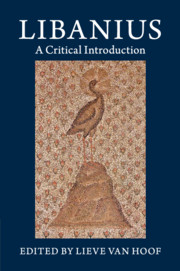Book contents
- Frontmatter
- Dedication
- Contents
- List of tables
- Notes on contributors
- Preface
- Abbreviations
- Introduction: Libanius at the margins
- Part I Reading Libanius
- Part II Libanius’ texts: rhetoric, self-presentation and reception
- Chapter 4 Libanius’ Orations
- Chapter 5 Libanius’ Declamations
- Chapter 6 Libanius’ Progymnasmata
- Chapter 7 Libanius’ Letters
- Chapter 8 The reception of Libanius: from pagan friend of Julian to (almost) Christian saint and back
- Part III Contexts: identity, society, tradition
- Appendices: survey of Libanius’ works and of available translations
- References
- Index locorum
- General index
Chapter 4 - Libanius’ Orations
from Part II - Libanius’ texts: rhetoric, self-presentation and reception
Published online by Cambridge University Press: 05 October 2014
- Frontmatter
- Dedication
- Contents
- List of tables
- Notes on contributors
- Preface
- Abbreviations
- Introduction: Libanius at the margins
- Part I Reading Libanius
- Part II Libanius’ texts: rhetoric, self-presentation and reception
- Chapter 4 Libanius’ Orations
- Chapter 5 Libanius’ Declamations
- Chapter 6 Libanius’ Progymnasmata
- Chapter 7 Libanius’ Letters
- Chapter 8 The reception of Libanius: from pagan friend of Julian to (almost) Christian saint and back
- Part III Contexts: identity, society, tradition
- Appendices: survey of Libanius’ works and of available translations
- References
- Index locorum
- General index
Summary
Introduction
This chapter discusses Libanius’ Orations. The terms used in Latin and in modern languages to denote this part of Libanius’ output – oratio, oration, discours, Rede, orazione, discorso – risk to cause confusion as they are far too restrictive compared to the Greek term, logos, which covers a much larger variety of texts. Indeed, the collection of Libanius’ logoi comprises everything that cannot be classified as letters, declamations or progymnastic exercises, that is, a group of texts highly diverse in terms of size, theme, addressees, form and circumstances of publication. In Late Antiquity, logos stands not only for literature, but also for the kind of text in which intellectuals express and diffuse their views. The late antique logos thus straddles the boundaries between the modern newspaper opinion, essay and even fiction. Given their rhetorical education, contemporaries of Libanius such as Julian, but also Christians such as Gregory of Nazianzus, all wrote ‘orations’ in view of these various aims.
Whilst sixty-four orations have been handed down under Libanius’ name, it is clear that he must have composed many more. In his Life (Oration 1, Autobiography) and Letters, Libanius mentions panegyrics which he wrote for Gallus, Valens and Phasganius, but of which we have no trace. In addition, we know that Libanius regularly showed his abilities as a sophist before a public of students, parents and the wider elite by performing either a declamation or an oration (or sometimes both). Given his fifty-year-long activity, already his production for those purposes only must have been very considerable.
- Type
- Chapter
- Information
- LibaniusA Critical Introduction, pp. 81 - 106Publisher: Cambridge University PressPrint publication year: 2014
- 2
- Cited by

